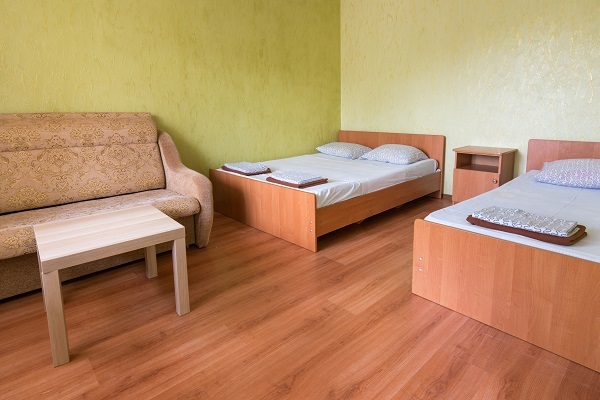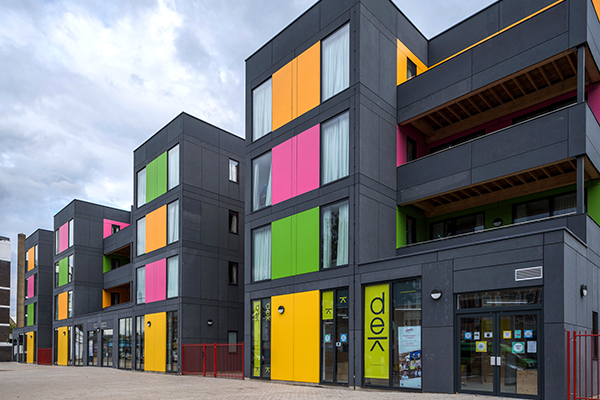You are viewing 1 of your 1 free articles
Revealed: homeless families face long stays in council-owned hostels
Inside Housing has found that London councils are building their own hostels. But their exemption from a law on how long families can live in these conditions could be causing harm. Jess McCabe reports. Illustration by Luke Best. Photography by Alamy
On the day Natasha moved into a hostel in south London, her toddler was having a nap when she heard a noise from the corridor. It was the sound of someone kicking her door.
“I realised they were trying to get in. They said something like ‘is somebody in there?’ and they heard the TV.” Eventually they gave up. She called the police – but the culprit was never identified.
The kitchen and bathroom were down the hall in a shared area, and Natasha describes having to check and recheck the door was locked every time she needed to leave the room. It was “horrible”, she says. “I was really depressed.”
Temporary accommodation is meant to be a stopgap until proper housing can be found. Natasha came to that hostel after several moves from one B&B to another, each with its own horrible elements – drug-taking, stairs visibly crumbling away, vermin. But whereas each of those had lasted only weeks, Natasha found herself stuck in this hostel for a further year.
What was different about this hostel? Rather than being owned by a private landlord or agency, this building was owned by her council.
That makes it one of a growing number of temporary accommodation sites owned and run by councils across London. As rents soar and benefit reforms kick in, boroughs are faced with two consequences: growing numbers of homeless families, and fewer private landlords willing to provide temporary accommodation – as conversion to regular flats and houses for rent or sale is more profitable.
An investigation by Inside Housing has found that councils are trying to build themselves out of this crisis by acquiring their own hostels. But at the same time, these hostels are exempt from legal limits on how long families with children are meant to be placed in unsuitable temporary housing.
To understand Natasha’s situation, we have to go back to 2003. At this point, there was a crisis of 95,000 homeless families being housed in B&Bs. In response, the Labour government of the day passed the Homelessness (Suitability of Accommodation) (England) Order 2003. This legislation brought in the rule that councils legally should not leave families with children in non-self-contained accommodation for longer than six weeks.
Number of hostels by London borough (click on boroughs for data)
Source: figures obtained by Inside Housing from local authorities
The law identifies as unsuitable any accommodation where a kitchen, bathroom or personal washing facilities are shared.
As Raji Hunjan, chief executive of charity Zacchaeus 2000 Trust, points out: “Families need and must have proper self-contained temporary accommodation to ensure their children’s health, education and well-being is harmed as little as possible by their homelessness.”
However, when the law was written, it included an exception. The six-week limit didn’t apply if the accommodation was “owned or managed by a local housing authority, a registered social landlord or a voluntary organisation”.
Inside Housing has spoken to several campaigners who were involved in pushing for the six-week limit, but none were sure of the reasons for this exemption.
Since 2003, the housing market has changed dramatically. Local authorities across England spent £1.15bn on homelessness services nationally in 2015/16. According to London Councils – a cross-party organisation that represents all 33 London councils – three-quarters of this, or £845m, was spent on temporary accommodation, with the majority in London.
Sir Steve Bullock, executive member for housing at London Councils and mayor of Lewisham, says: “The level of pressure has led authorities to look at a variety of options to assist them in achieving positive outcomes for households. This includes the purchasing – or even building – of stock for the relief of homelessness.”
Sir Steve says that given the range of activity by councils, it is difficult to comment “overarchingly on the implications”, before referencing the “great outcomes” of Lewisham Council’s Ladywell scheme.
The Ladywell scheme Sir Steve refers to is groundbreaking, and miles away from the negative experiences of Natasha and many homeless families.
"275 hostels are owned by councils across London and used for temporary accommodation"
The south London council set up a ‘pop-up village’ at a cost of £3.4m, made up of 24 factory-built flats. These flats can even be deconstructed and reassembled again on any vacant land that is going unused prior to development. Each has its own kitchen and bathroom.
Other forays by London councils are more traditional. To get a sense of what is happening, Inside Housing made Freedom of Information Act (FOIA) requests to all 33 London boroughs.
We found that 24 of these own hostels. The most heavily invested is Hounslow, which owns a massive 91.
In total, 275 hostels are owned by councils across London and used for temporary accommodation. Eight councils have active plans to build or acquire more.
Barking and Dagenham is a typical example. The east London council most recently converted some former teachers’ housing into temporary accommodation, which opened in January 2016. Butler Court has 78 bedrooms, with shared kitchens and bathrooms.
At the time it opened, Saima Ashraf, deputy leader of the council, said: “Unfortunately the number of families coming to the council for help is increasing and finding suitable accommodation for them while their case is being assessed can be difficult. And of course B&B accommodation is expensive and it’s not always ideal – varying in standards and often too small. That’s why I am thrilled with this new facility; it offers both shelter and support.”
Our investigation revealed a lot of activity as councils deal with the fallout of the homelessness crisis.
Inside Housing then sent out a second FOIA request. We wanted to find out if – as well as building to meet demand – councils were keeping families for lengthy periods in accommodation that wouldn’t be legal if it was privately owned, because it was not self-contained.
In some cases we simply found there is no problem. For example, Harrow – which owns one hostel, made up of 95 bed spaces and two self-contained flats – told us it has no families with children in non-self-contained accommodation for longer than six weeks.
However, other responses show Natasha’s situation is not a one off. Kingston in south London, for example, had 27 families with children housed in non-self-contained accommodation for longer than six weeks, of which 19 were housed for more than six months.
“Spending long periods of time living in a hostel puts families under huge strain.”
All of these are in accommodation owned by the council, and therefore not covered by the six-week limit. Councils say this is the best of a bad set of options. “Kingston has very few B&B hotels available in-borough,” a spokesperson for Kingston Council says.
Camden has 21 families in non-self-contained temporary accommodation for more than six weeks, all in properties owned by the council. Nineteen had been there for more than six months.
“The shared accommodation… bears no comparison to that provided by bed and breakfast private sector hoteliers. It is a hostel that provides much-needed, in-borough temporary accommodation for families who would otherwise be placed out of Camden away from support networks, local schools and services,” a spokesperson says.
“The private sector market for rented property for homeless households in Camden is close to zero because of the low level of Local Housing Allowance and the benefit cap,” they add.
Lambeth has the highest numbers. There are 135 families who have been living in Lambeth-owned non-self-contained accommodation for more than six weeks, and 104 for longer than six months.
By contrast, in all other non-self-contained accommodation, Lambeth has nine families staying for longer than six weeks, and none longer than six months. Again, the council puts this down to a lack of other options.
“Sadly, as with every other London borough, we have a demand for temporary accommodation that exceeds supply,” a spokesperson says. “The available accommodation is being used in the best way possible to ensure people have a roof over their heads.”
Conditions are tough for councils. But housing campaigners argue this is still not acceptable. Polly Neate, chief executive of Shelter, points out: “While it’s good that councils are seeking to provide more emergency accommodation themselves, it is worrying that some homeless families are then trapped in it for months on end.
"Conditions are tough for councils"
“Spending long periods of time living in a B&B or hostel and having to share kitchens or bathrooms with strangers puts families under huge emotional and physical strain. That’s why it’s essential councils aim to move families somewhere more suitable within six weeks, even if the accommodation is council-owned.”
Ms Hunjan of Zacchaeus 2000 Trust, agrees: “Under no circumstances can spending months on end in a bed and breakfast be justified for homeless children.
“If, as these Freedom of Information Act responses reveal, London boroughs have been taking over the ownership or management of B&Bs for homeless families, they need to come clean about it and ministers should amend the regulations to extend the six-week limit to local authorities and housing associations.”
Back in south London, Natasha was finally able to move into a privately rented flat last summer. She’s currently on the waiting list for a council home and wishes to remain anonymous, so it has not been possible to contact the council to comment.
Natasha leapt on the chance to move out of the hostel, although when she viewed her flat it was unfurnished and “empty apart from a wardrobe and two lampshades”.
For Natasha this has been a transformation. Now she is able to start thinking of going back to studying or getting a job, and importantly it is a better home for her toddler. “I bought my son pet rats. He loves them,” she says.
Inside Housing Spotlight
Inside Housing Spotlight is a series of pieces showcasing the best of our investigative and data journalism.
Spotlight pieces:
14 December 2018: Starting to bite - how Universal Credit is making people homeless: we reveal new figures showing a clear link between Universal Credit and homelessness
9 November 2018: First Priority - the inside story of a housing association which almost went bust When a small supported housing provider entered into a series of leasing deals with investment funds, it nearly spelled disaster for its vulnerable tenants. We investigate why.
12 October 2018: The ballad of Knowsley Housing Trust the inside story of the first housing association made non-compliant by the sector's watchdog for fire safety issues
13 September 2018: How tweaked building guidance led to combustible insulation on high rises: an investigation shows how lobbyists from the plastic insulation industry supported a quiet tweak to building guidance to permit combustible insulation on tall buildings
31 August 2018: The true cost of homelessness Freedom of Information requests reveal the soaring costs of temporary accommodation
30 August 2018: The forgotten threat to high rise tenants We investigate the threat posed by combustible window panels on social housing high rises
13 June 2018: The Biggest Ever Survey of Fire Risk Assessments Data journalism revealing widespread fire safety issues in more than 1,500 tower blocks across the country
12 April 2018: A Section 106 Story An investigation into allegations of "sham transactions" involving Section 106 deals in south London
23 March 2018: The Paper Trail: The Failure of Building Regulations A lengthy investigation into the failures of building regulation that may have contributed to the Grenfell Tower disaster, and the many missed warnings
23 February 2018: The Kingspan Papers Leaked meeting notes reveal some worrying issues, including allegations of fire safety report doctoring by manufacturers
9 February 2018: Gentoo: a Sunderland story We look back at the recent history of Sunderland’s largest housing association.
25 January 2018: Homeless families face long stays in council-owned hostels we reveal how councils in London are skirting the law by using hostels to house people in temporary accommodation for more than six weeks
7 December 2017: Council house to private rent We reveal the percentage of former Right to Buy homes in the private rented sector has passed 40%
17 November 2017: Rent to buy, or rent to rent? A look at how successful the government's Rent to Buy schemes have been
7 September 2017: Once upon a time in the west The history of KCTMO in the years before the Grenfell Tower fire
11 August: 2017 Grenfell: The paper trail - our news editor Pete Apps examines seven years of council documents to tell a story of the missed opportunites to prevent the Grenfell tragedy
4 August 2017 : Knowing the risks – the most common fire safety problems in tower blocks
26 May 2017: Rents hiked for RTB replacements – Sophie Barnes reveals less than half of Right to Buy replacement homes are for social rent
12 May 2017: A stark warning – a prescient piece looking at lessons to be learned from the Shepherds Bush tower block fire
13 April 2017: Where the axe will fall – a look at plans to axe housing benefit for younger people
10 Feb 2017: Circle of Despair – the inside story of Circle's repairs and maintenance troubles
3 Feb 2017: The Benefit Cap Tightrope – Sophie Barnes unveils the first exclusive analysis of the lower benefit cap
















